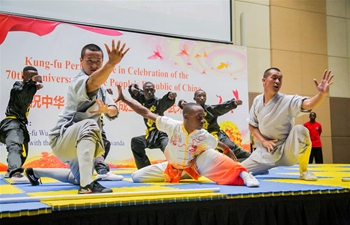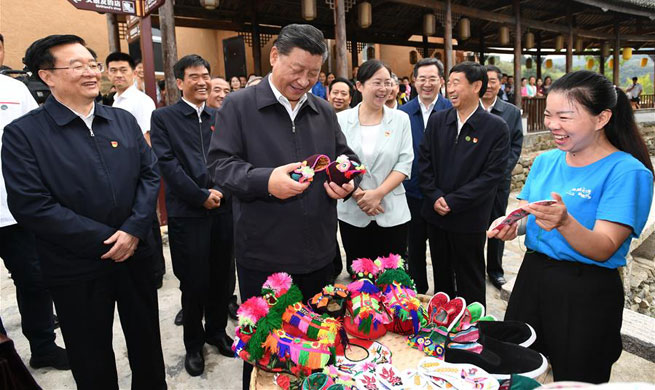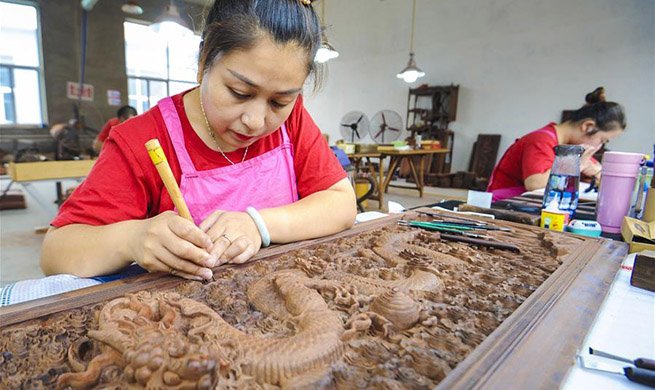BEIJING, Sept. 17 (Xinhua) -- At 6 a.m., Liu Xuejing gets up to make soybean milk, her 3-year-old grandson's favorite drink.
Liu, 63, retired from her job working in a hospital in Beijing nine years ago and has since put her energy into babysitting and photography.
In early morning, Liu rushed to the Palace Museum to capture the fresh look of the almost 600-year-old architecture.
In half a day, she had taken over 2,000 pictures.
Liu could not wait to sit in front of her computer after lunch and looked through the pictures. She picked the top 200 and then carefully retouched 20 out of the whittled-down selection.
Her desk is surrounded by boxes of photo magazines, albums and equipment. She has bought three footstools, four single-lens reflex cameras and eight camera lenses of various kinds.
There were about 250 million people aged 60 and above in China at the end of 2018, accounting for about 18 percent of the country's total population.
Like Liu, more and more people in China have begun to enjoy life, cultivate hobbies and fulfill their dreams after retirement.
SHANGHAI, EAST CHINA
For Zheng Zheng, 33, her workday starts at 8 a.m. when she begins a 22-km daily commute to Lujiazui, a financial hub in Shanghai's Pudong district.
As always, the subway is packed with young commuters. Zheng usually manages to squeeze in on the second train. But on a bad day, she will have to wait in line for several more.
One and a half hours later, she arrives at her office and starts her work as an operational director at a private investment firm.
Soon Zheng sits in on a telephone conference with representatives from a bank, a supply chain firm and a target company.
HUNAN, CENTRAL CHINA
In the meantime, some 1,000 km away, Yuan Qiying is also attending a meeting in Mituo, a remote hilly village of Xiangxi Tujia and Miao Ethnic Autonomous Prefecture, a major battlefield for China's poverty-relief mission.
As the leader of an anti-poverty workgroup stationed in the village in central China's Hunan Province, she has a full day ahead.
To catch up with the national agenda, Mituo village plans to eliminate extreme poverty by the end of this year. This means that 282 people from 75 impoverished households in the village need to shake off poverty.
"It is the fifth year that I have worked in the village and the most crucial year," she said.
Yuan, a civil servant in the prefecture seat, was dispatched as the anti-poverty team leader to Mituo village in 2015. When her three-year term ended, the local authorities wished for her to stay, as she won high credibility among villagers.
Over the past five years, she learned some Miao ethnic language to better communicate with locals.
SICHUAN, SOUTHWEST CHINA
Laying out all the ingredients and materials their son buys in the morning, He Zhangwen and his wife He Yunping begin their typical day by making fillings and flour paste.
He, 64, is slightly hunchbacked and not particularly fond of smiling. Wearing a grey-striped T-shirt and a brown apron, he is the linchpin of the tiny baked egg pancake shop "The He's" in Chengdu, capital of southwest China's Sichuan Province.
While Sichuan cuisine is known for spicy and pungent flavors, baked egg pancakes are sweet.
By 10:00 a.m., he and his wife have finished all the fillings and two buckets of paste, each weighing 10 kg. Every day they would use two to four buckets. Putting everything on the back of his battery car, He hurries off to the store, which is only a two-minute ride away.
Their store opens each day at 11:00 a.m., and He is often welcomed by a long queue of gluttonous foodies.
The store was rented seven years ago and expanded to the current scale in 2016. They started the business on a small trolley in 1990. Now besides this store, the He's chain business has opened nine franchise stores in Chengdu.
"I can't believe it's been nearly 30 years," he said. "Areas outside the first ring road were all idle fields when we started, but now even the suburban ring road has traffic jams."
ANHUI, EAST CHINA
Yuan Lanfeng, an associate researcher of physical chemistry in eastern China's Anhui Province, does not have class on Thursday. But he still works at home starting at 7:30 a.m., reviewing a short film he made for promoting pop-science on China's online video-sharing platform of Bilibili.
He made the 20-minute film with his students at the University of Science and Technology of China, commenting on India's failure on lunar landing on Sept. 7.
The 41-year-old scientist is a cyber celebrity, garnering two million followers with more than 100 episodes of short films on hot science issues on Bilibili and Weibo since 2018. The program covers science knowledge ranging from chemistry and physics to economics to industries.
"These videos have been viewed more than 150 million times online," said Yuan.
He spent the afternoon answering questions on students' thesis writing over the phone and discussed with 18 science teachers on a WeChat group about the opening of the new course "Scientific Spirit" in October.
China boasted a total of 829 million internet users by the end of last year, according to a report on China's internet development published in February. Of them, 98.6 percent, or 817 million, used mobile phones to surf the internet. In addition, some 222 million, or 26.7 percent, of the online population live in rural areas.
TIBET, SOUTHWEST CHINA
Afternoons for Yanglha, 46, a Tibetan ancient book restorer, are almost identical to her mornings.
In her 70-square-meter office in the regional library, she carefully takes out a broken pattra-leaf scripture from a box before scanning it. The first step is to build a digital record for it.
"The scripture is 500 years old. It's about Tibetan medicine," she said.
She finished the repair of three pages in the morning and another two in the afternoon. The work of cultural relic restoration is tedious and solitary, but Yanglha has her own way to enjoy it.
China has several hundreds of thousands of ancient Tibetan literature, with more than half of them collected in more than 1,300 temples, monasteries and libraries, museums and archives centers across Tibet.
In 2012, Yanglha, a librarian at the time, accidentally walked into the world of ancient literature and opened a new chapter in her life as a restorer.
"I see my job as being a doctor. You have to treat each and every page differently. Any negligence may lead to the total loss of a part of history," she said.
SHANGHAI
At 5:30 p.m., Zheng Zheng goes off work and begins the second part of her day in a nearby gym.
The workout plan for the night involves an hour of body pump and another hour of spinning, both of which instructor-led training with a group of 20-plus people.
"Working out is tiring, but it is refreshing and lets me blow off steam," she said.
Working out at the gym for nearly three years has made Zheng fitter and in a better physical state. During overseas trips, she now adds more mountain climbing and hiking to her itineraries.
SICHUAN
When a rush at the He's restaurant starts, the couple and their son take turns baking egg pancakes and making ice jelly. Their hands flip between three ovens, with two to three pancakes coming out within one minute. The restaurant, full of diners, has two long lines outside waiting in the stifling heat. The family will not be able to relax until 9 p.m. when they close.
ANHUI
Yuan Lanfeng often spends the night reading online comments of his video episodes. "But today is special. After all, it's my day off," he said. At his wife's request, the couple watched the newly-released movie Aladdin before they called it a day.
BEIJING
After dinner, Liu Xuejing, who is also a sports enthusiast, watched the live stream of a 2019 FIBA World Cup game and turns on the computer again to screen out the photos.
"Next year marks the 10th anniversary of me setting foot in photography. I plan to have an album of the Palace Museum," said Liu.
HUNAN
When Yuan Qiying walked back "home" to the office, it was 9 p.m.
After supper, she visted Shi Dechang's home. The 77-year-old man is restricted to a bed after a hemorrhagic infarction two months ago.
Yuan checked Shi's medical bills totaling over 7,000 yuan and understood that Shi only needs to pay 1,000 yuan, as the rest is covered by medical insurance.
She had planned to visit another poor family but was set back by a sudden stomachache.
Her dorm is renovated from a small office and decorated with simple furniture.
Before going to bed, she looked at her son's picture on her cell phone. The young man is enrolled by a university in Changsha, the capital city of Hunan Province.
Yuan is among thousands of grassroots officials in China to help impoverished rural people to get rid of poverty. Between 2012 and 2018, China has lifted 82.4 million rural people, about the population of Germany, out of poverty.
By the end of 2018, 16.6 million people were still living in poverty and areas with relatively poor infrastructure. All of them are expected to be lifted out of poverty by 2020.

















